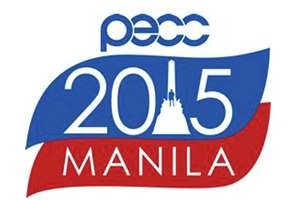The Philippines PECC committee hosted the 23rd General Meeting of PECC in Manila
 PISFA (Philippine International Seafreight Forwarders Association) was represented by its President Mrs Mariz Regis and Director Mrs. Doris Torres, President and General Manager of STAMM International
PISFA (Philippine International Seafreight Forwarders Association) was represented by its President Mrs Mariz Regis and Director Mrs. Doris Torres, President and General Manager of STAMM International
The Philippines PECC committee hosted the 23rd General Meeting of PECC in Manila with the theme, “Growth Engines for the 21st Century: Achieving Balanced, Inclusive, and Sustainable Growth.”
Following are the plenary and concurrent sessions of the General Meeting:
Plenary Session 1: Sustainable and Inclusive Growth in the Asia-Pacific Century
The 21st century was touted as the Asia-Pacific century, 15 years on with the fallout from the Global Financial Crisis still bearing over the world economy, what will the drivers of growth be in the coming 5-10 years? The structural changes taking place in major economies such as China, Japan and the United States, the growing constraints on the supply of resources and environmental concerns will have a profound impact on prospects for growth for the entire region. On the other hand, the broader adoption of new technology and new ways of conducting business may provide solutions and opportunities for growth. What role for policy reform and regional cooperation to facilitate new growth engines?
Plenary Session 2: Challenges of Promoting Inclusive Growth
Over the past 35 years the world has witnessed an almost unprecedented increase in the creation of wealth and a reduction in global income inequality. Since 1970, the share of global income of the richest countries has gone down from 87 percent to 74 percent and the average global income has doubled from around US$4,000 to close to US$8,000. However, income inequality within economies has also been on the rise. What can be done to ensure that the next phase of growth is more inclusive?
Plenary Session 3: Mega-Regionals and the Future of the Trade System
When the Philippines last hosted APEC in 1996, there were relatively few preferential trade deals among regional economies. Since then, driven by the stalling of the WTO Doha Round and impatience from the business community the trend has been towards bilateral and regional trade deals. Some of these are being consolidated in the form of the Trans-Pacific Partnership (TPP), the Regional Comprehensive Economic Partnership (RCEP), and the Transatlantic Trade and Investment Partnership (TTIP). Is it now time to work towards the convergence of these agreements as suggested by a panel of experts convened by former WTO Director General Pascal Lamy?: “We recommend that WTO members engage explicitly in an exploration of ways in which preferential trade agreements and the principles underlying them could increasingly converge with the multilateral system.”
Concurrent Sessions:
- Mining and Natural Resources
- Principles for Promoting Resilient Economies
- The Role of Micro and Social Enterprises in Promoting Inclusive Growth
- The Internet Economy
Plenary Session 4: The Role of Regional Financial Cooperation in Promoting Economic Growth
While the Asia-Pacific region and especially East Asia have become increasingly integrated through trade, intra-regional financial flows are more limited. What steps can be taken to promote the efficient recycling of capital through the system to promote innovative, inclusive, and balanced growth in regional economies? Will we see increased use of local currencies in settlement of trade and financial transactions?
Plenary Session 5: Connectivity: Challenges for Global Value Chains
While regional policy-makers remain broadly supportive of free trade, and global value chains offer a quick way for economies to enter the trading system, international trade remains limited to the region’s cities and large companies. What are the priority issues that need to be addressed to ensure that more of the region’s small and medium enterprises can engage in international commerce? How can we strengthen the services sector to promote greater participation in global value chains? What strategies can second and third tier cities pursue to benefit from globalization and integration?
For further information, refer to: www.pecc.org/pecc23
Download presentations from the GM
President Benigno S. Aquino’s speech
Aquino cites human investment as key to inclusive growth (Philippine Information Agency)
Related press release: Achieving Resilient and Inclusive Growth
The GM was preceded by the PECC Standing Committee meeting on the 10th and followed by a workshop on FTAAP (Free Tree Area in the Asia-Pacific) in the afternoon of the 12th.The FTAAP Workshop covered the state of play in regional trade agreements as well as how value chains might be mapped in the region in addition to work done so far by APEC on FTAAP and what PECC could do to further contribute to the study.
As part of PECC’s Next Generation Program, selected youth delegates from participating member committees were invited to attend the GM and parts of the Standing Committee meeting.






